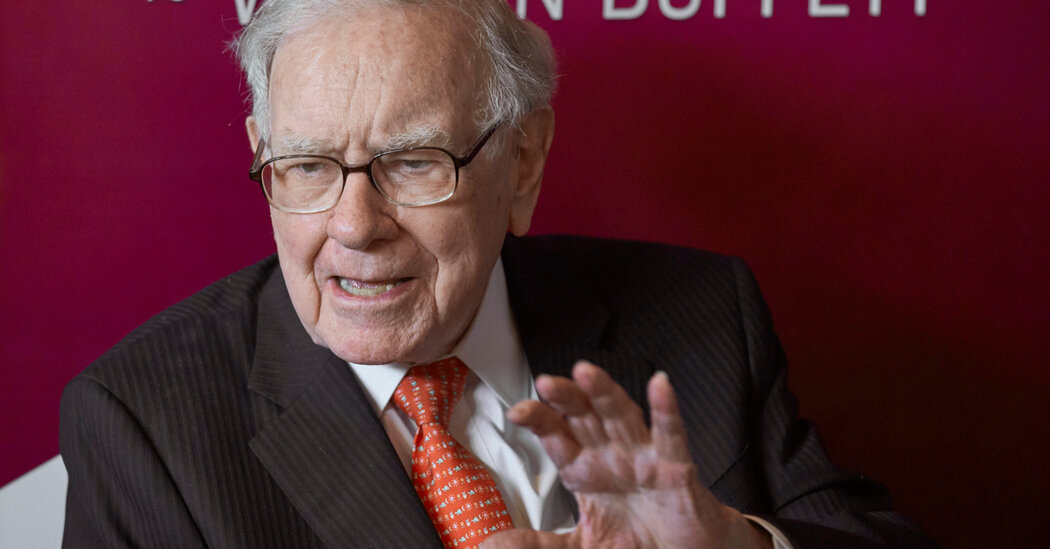Warren E. Buffett would like to make one point about Berkshire Hathaway, the conglomerate he manages: It’s a good corporate citizen of the United States.
Announcing Berkshire’s nearly $90 billion profit for 2021 on Saturday, the billionaire stressed in his annual letter to shareholders the outrageous role the company — whose businesses run from the BNSF Railroad to Geico insurance to See’s Candies — is playing. in the United States economy.
It’s Mr. Buffett’s latest attempt to wrap himself and his $713 billion company under the banner, as it remains one of America’s most successful companies. Last year turned out to be good for Berkshire, with the company reporting a profit of $89.8 billion, more than double what it made in 2020.
Earnings growth follows the rise of the broader economy as the United States and other countries recover from the depths of the pandemic.
Much of Berkshire’s results have also been supported by its massive investment portfolio, which is funded by the vast sums of money its insurance operations generate and is a traditional source of its financial strength. Those holdings include a 5.5 percent stake in Apple, making Mr. Buffett one of the iPhone maker’s largest shareholders — and beneficiaries of its strong stock performance last year.
The conglomerate has outperformed the S&P 500 stock index so far this year as its mix of diverse companies and investments has benefited from the broad economic recovery.
And the company is sitting on massive financial resources, including $144 billion in cash and equivalents that will be used in part to buy back its own shares, driving its share price, with Class A shares closing at $479,345 Friday. In the past two years, Berkshire has spent nearly $52 billion to buy back its shares. (Mr. Buffett downplayed the option of long-term use of Berkshire’s cash, massive corporate takeovers, saying “internal opportunities” produced better returns.)
But as corporate giants come under criticism over a range of issues, including how little tax money is being paid, Mr. Buffett in his annual shareholder letter, which has traditionally been closely watched by his many fans, made the effort to highlight how much Berkshire contributes to the national economy.
Take taxes for example: Mr. Buffett noted that Berkshire paid $3.3 billion in federal taxes last year, as well as “significant” amounts in state and foreign taxes. According to his story, that illustrates how much the company is giving back to America by calling the Treasury Department a “silent partner” in its business.
Mr. Buffett also praised the government’s role in enabling his business. “Our shareholders should recognize – trumpet indeed – the fact that Berkshire’s prosperity has been promoted mighty because the company has worked in America,” he wrote.
“Without our American home, however, Berkshire would never have come close to what it is today,” he wrote. “When you see the flag, say thank you.”
In his letter, Buffett also said Berkshire owned and operated more U.S.-based infrastructure assets than any other U.S. company, an aside as the federal government prepares to spend $1 trillion on upgrading the roads. bridges and other infrastructure of the country .
He called the BNSF railroad, one of Berkshire’s largest divisions, “the number one artery of American commerce” and said it carried 535 million tons of freight over 143 million miles last year.
Saturday’s letter also aimed to polish Berkshire’s climate credentials, as Mr. Buffett is under pressure from some investors to do more to improve both his environmental performance and the disclosure of his achievements there. Last year, the company faced a shareholder proposal, backed by some major investors, that would have demanded more reporting on its operations’ responses to climate change. (The measure was rejected, in part because of Mr. Buffett’s significant control over Berkshire’s stock.)
Discussing BNSF, Mr. Buffett argued that the railway has helped reduce the country’s carbon footprint. “If the many essential products that BNSF carries were transported by truck instead, America’s CO2 emissions would skyrocket,” he wrote.
And he argued that Berkshire Hathaway Energy, the company’s massive energy division, has been outlining its renewable energy goals and achievements since 2007. long made climate-conscious movements that suck all of his earnings.”
While the division had “no solar or wind power generation” in 2000, he wrote, it is now “a leading force.” He added: “BHE has the management, the experience, the capital and the appetite for the massive energy projects our country needs.”
Mr. Buffett will resume another Berkshire tradition — a personal annual meeting of the company’s shareholders — in late April after hosting the event pretty much since the start of the pandemic. Long known as “Woodstock for Capitalists,” the annual meeting has usually drawn tens of thousands of Berkshire shareholders to Omaha for the chance to hear directly from Mr. Buffett for hours on end. To attend the 2022 meeting, Berkshire will require proof of Covid-19 vaccination.

